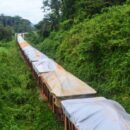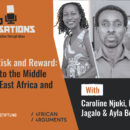One hundred years on, we must not forget Africa’s role in the First World War – By Richard Dowden

 One hundred years ago this week, self regarding, ignorant and weak leaders with the primitive belief that God was on their side, ancient tribal hatreds and total disregard for human life, combined to make decisions that killed an estimated 16 million people and wounded at least 20 million. These decisions wrecked the lives of millions more, setting economies back decades, including in Africa which is often forgotten. A hundred years ago this week Europe was indeed The Hopeless Continent.
One hundred years ago this week, self regarding, ignorant and weak leaders with the primitive belief that God was on their side, ancient tribal hatreds and total disregard for human life, combined to make decisions that killed an estimated 16 million people and wounded at least 20 million. These decisions wrecked the lives of millions more, setting economies back decades, including in Africa which is often forgotten. A hundred years ago this week Europe was indeed The Hopeless Continent.
Then they did it again 21 years later. The second round was about something important; a battle not between tribes but ideologies. But the First World War was purely tribal rivalry – who is to be top dog in Europe. Like many however, my parents always referred to the enemies as Germans, not Nazis.
The media will devote much time over the next four years to recall and debate the reasons why. My fear is that each country will only cover it from its own perspective of victory or loss.
In Britain the First World War is predominantly viewed today through the eyes of the poets, particularly Wilfred Owen. The recollection on Armistice Day is for remembering the fallen, not an acclamation of victory. The delight of Winston Churchill and others like him who reveled in war is quietly forgotten.
The first war was a ghastly meaningless mistake whose chief significance was that it led to the Second World War. For France however the war was about survival. It was fought largely on French territory and despite horrific losses France held on. But the vengeful settlement the country insisted on imposing on Germany in the aftermath led to the rise of Nazism and the second war.
The Russian attitude was interesting because its revolution in 1917 took it out of the war. It is interesting to hear Mr Putin blaming the Bolsheviks for withdrawing from the war. He said this week: “it was called an imperialist war in Soviet times…. there is no difference between the first and second world wars” because in both cases “people gave their lives for their country and should not be forgotten”. There is, he pointed out, not a single First World War memorial in Russia.
For Germany the stress is on regret. President Joachim Gauck said this week that his country was “completely unjustified” in invading Belgium. He called it the “triumph of extreme nationalism over empathy and of propaganda that knew no bounds”.
The war was the first remembered peoples’ war. All previous wars are remembered by official accounts and the occasional writer who happened to be there. The First World War is remembered in millions of family letters and photos and an excellent archive of personal memories that the BBC has collected over the decades.
My great aunt who lived in Paris in 1914 told me that when she heard the gunfire as the Germans advanced she decided to go home to London. When she got to Calais she found the piers lined with hundreds of stretchers bearing wounded soldiers waiting to be shipped back to Britain. Shortly after, her fiancé was killed.
My grandfather left his wife, two children and his job as a civil servant and signed up for the navy on the day war was declared. He was sent with the Naval Division to defend Antwerp but the train which took them from Dunkirk was stopped by a German patrol and they surrendered. He never fired a shot and spent four miserable years in a prisoner of war camp.
A disabled old man called Henry who lived in a flat in Paddington who I visited as a student had been on the Western Front. He showed me a note written in German. He had been guarding some prisoners and asked them to write the note in German saying he had them well and sign it with their names and unit so that if he was ever captured he might give it to his captors and be treated well. Amid the industrial slaughter and careless killing, there were moments of amazing humanity.
Who remembers the First World War in Africa? The accounts of the time were about the exploits of British and white South African troops but thanks to Edward Paice who wrote Tip and Run: The Untold Tragedy of the Great War in Africa we have a far clearer picture of what happened when Africa became a battleground for the Germans, British and French.
He points out that the official death toll was more than 105,000 of whom only 11,189 were British troops. The rest, 95,000, were mainly African carriers who were at first paid but later press-ganged into carrying supplies for the troops. The full figure was higher but may never be known as many of those forced to carry were not registered. Disease was their biggest killer. 50% of the Gold Coast (Ghana) Regiment died of exhaustion, starvation or disease. Some 50,000 Kenyans died. The Germans kept no record of their African carriers who were not paid.
Of course, with so many men forced to leave their villages farming collapsed in some areas and in many places there was mass starvation. Paice reckons the toll of African civilians on the German side was at least 300,000. But, as in Europe, the end of the war was accompanied by the outbreak of influenza, a new disease in Africa. It killed between 1.5 and 2 million Africans. “The scale and scope of the Great War in East Africa, in particular, was gargantuan” writes Paice.
The only monument in Africa that I know of which commemorates the war is a grave of a young British soldier near the Uganda-Tanzania border. The local people still tend it. There is also a memorial in Nairobi. But where are the monuments in Berlin, Paris, Brussels and London to the Africans who died in Europe’s appalling outbreak of tribal mass murder?
Richard Dowden is Director of the Royal African Society and author of Africa; altered states, ordinary miracles. Follow Richard on twitter@DowdenAfrica







Of course they were Germans, not Nazis. They were citizens of Germany, not Nazi party members. Calling them Nazis is like saying that the Republican soldiers invaded Afghanistan and Iraq.
I have seen memorials in Malawi (eg Mangochi) and Zambia.
Dear Richard, the best known monument in Dar es Salaam, the askari monument in the city centre, clearly commemorates the First World War, with panels depicting porters and soldiers. There is also a monument in Tabora to Belgian colonial soldiers and porters.